Publications
Articles, publications, books, tools and multimedia features from the U.S. Institute of Peace provide the latest news, analysis, research findings, practitioner guides and reports, all related to the conflict zones and issues that are at the center of the Institute’s work to prevent and reduce violent conflict.
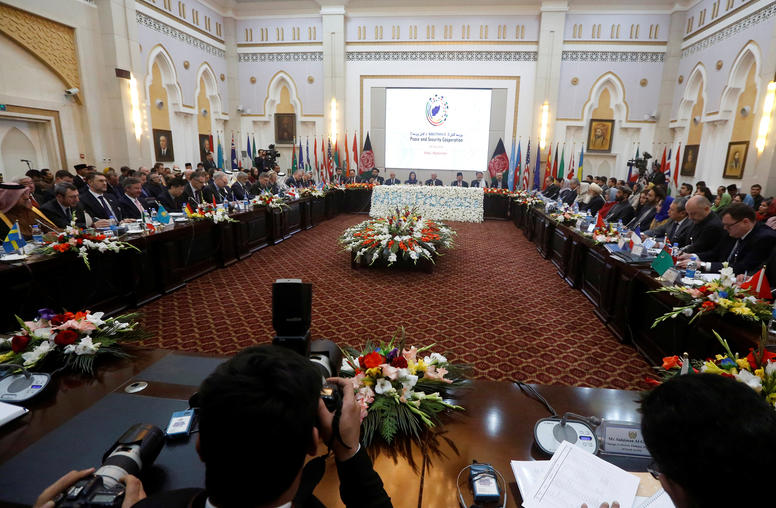
Intra-Afghan Peace Negotiations: How Might They Work
Recent positive developments in the Afghan peace process have renewed hopes that the country’s 17-year-old conflict could come to a close. Direct negotiations between the Afghan government and the Taliban, however, are likely to involve complex constitutional questions. This Special Report provides...
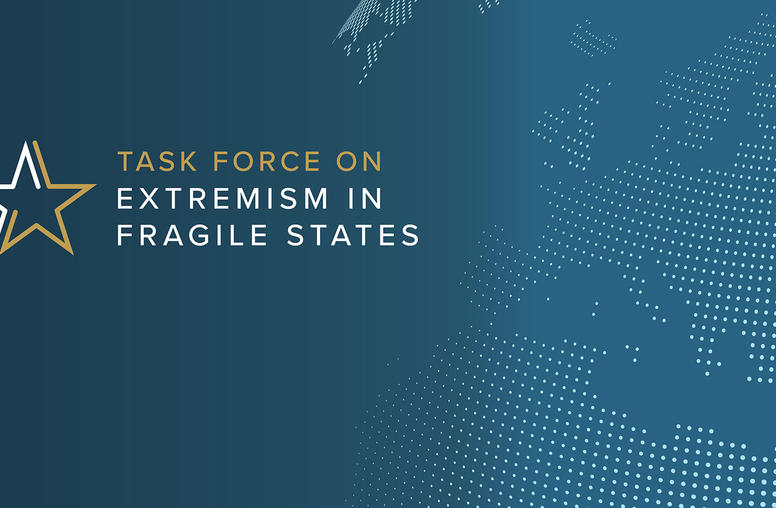
Preventing Extremism in Fragile States: A New Approach
Despite our success protecting America’s homeland, extremism is spreading. Since 9/11, the number of terrorist attacks worldwide per year has increased fivefold. As long as this continues, the United States will remain vulnerable to terrorism while extremism contributes to chaos, conflict, and coercion that drains U.S. resources, weakens our allies, and provides openings for our competitors.
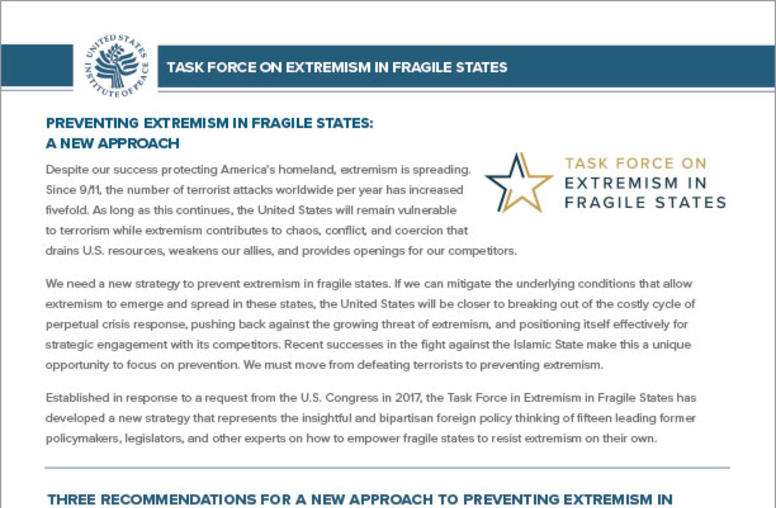
Three recommendations for a new approach to preventing extremism in fragile states
Despite our success protecting America’s homeland, extremism is spreading. Since 9/11, the number of terrorist attacks worldwide per year has increased fivefold. As long as this continues, the United States will remain vulnerable to terrorism while extremism contributes to chaos, conflict, and coercion that drains U.S. resources, weakens our allies, and provides openings for our competitors.

Nancy Lindborg on a New Prevention Paradigm
Following the release of the Task Force on Extremism in Fragile States’ final report, Nancy Lindborg explains why a new prevention paradigm is needed to address the root causes of extremism in fragile states. “We are in a moment of convergence and shared desire to figure out how to do these tough tasks differently,” says Lindborg.

Moeed Yusuf on Imran Khan’s Visit to Washington
Following Khan’s visit with President Trump, Moeed Yusuf says that the two leaders appear to have a chemistry that could improve U.S.-Pakistan relations. Although the two countries have been at odds over the Afghan conflict, Yusuf says Trump and Khan indicated they would “work together to find ways to break the impasse on Afghanistan.”
Preventing Genocide: A Blueprint for U.S. Policymakers
The Genocide Prevention Task Force, co-chaired by former Secretary of State Madeleine K. Albright and former Secretary of Defense William S. Cohen, was jointly convened by the United States Holocaust Memorial Museum, The American Academy of Diplomacy and the United States Institute of Peace. Its final report, Preventing Genocide: A Blueprint for U.S. Policymakers, offers practical recommendations on how to prevent genocide and mass atrocities. It was released in December 2008.
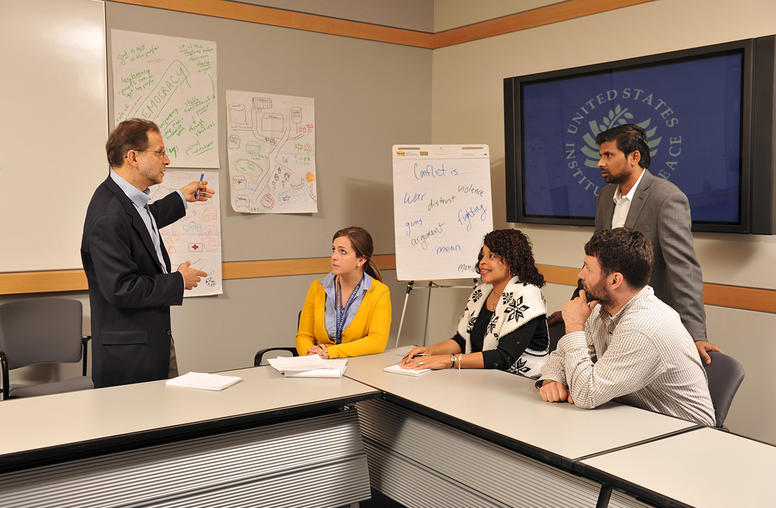
Balkans Initiative
USIP has been engaged in the Balkans since 1996, starting in Bosnia immediately after the signing of the Dayton Accords, and later expanding its activities to Kosovo, Serbia, Montenegro, and Macedonia.
Correlates of Public Support for Terrorism in the Muslim World
This report was commissioned by USIP's Center for Conflict Analysis and Prevention. Consistent with the center’s commitment to conflict prevention, this report aims to inform the center’s ongoing work to expand the understanding of the determinants of terrorism and its support base.
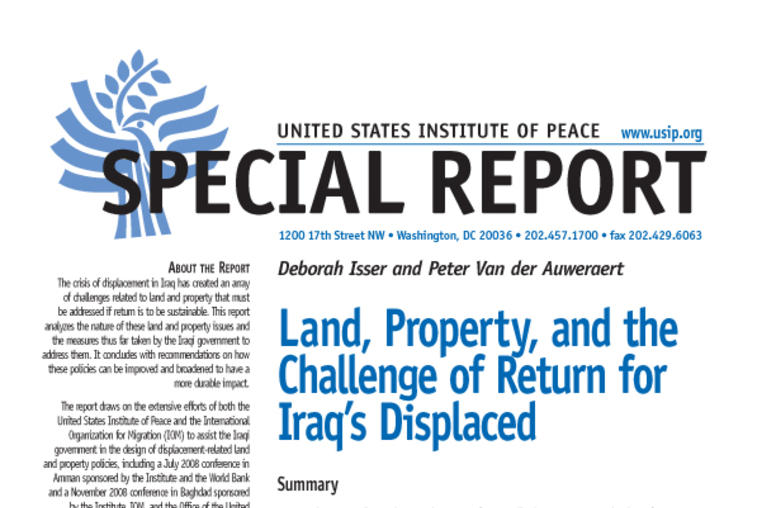
Land, Property, and the Challenge of Return for Iraq’s Displaced
Iraq today is faced with a multilayered displacement crisis that is massive in both size and complexity. It is estimated that 3.8 million Iraqis were displaced from their homes from 2003 to 2008, with the majority of them becoming displaced in 2006 and the first half of 2007
Won’t You Be My Neighbor: Syria, Iraq and the Changing Strategic Context in the Middle East
Overall, Syria has marginally benefited from the war in Iraq at both the regional and international levels. After watching the U.S. military unseat the Baathist regime next door in 2003 with unprecedented speed, it looked to many observers—including some in Damascus—as if Syria would be next in line.